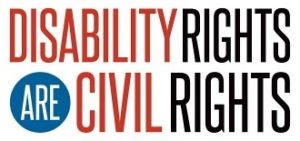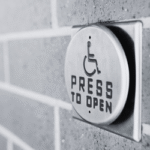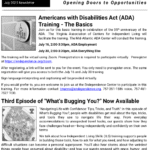Because of the ADA, access and inclusion are the standards, not just a nice idea.
The Americans with Disabilities Act (ADA) turns 32 this July 26, 2022. It is hard to believe that 32 years ago, access was something we fought for and, in some ways, we are still fighting to achieve. Often times when we talk about the ADA, we sum it up with ADA=Access. However, it is so much more. The ADA is a federal law that prohibits discrimination on the basis of disability in many circumstances and it breaks down these circumstances into five main parts they call titles:
- Title 1- Employment
- Title 2- Public Services
- Title 3- Public Accommodations
- Title 4- Telecommunications
- Title 5- Other provisions not covered in the previous 4
For people with or without a disability, it is important to understand what the passing of this law means. ECI employee, Rena Lewis, remembers what it was like before the ADA passed.
One of the issues for me growing up as a person with a disability was going to school. Schools did not have to educate any child with a disability. If you had a disability, they could just say no.
Getting employment was difficult for me, too. It was legal for employers to ask if you had a disability, the type of disability, and how you were affected by your disability. They could even ask for a doctor’s note explaining it. Very often, employers told me that they would not hire me because they were concerned for my safety. More often, employers just turned me down. So many things kept people with disabilities from working. For instance, there were buildings I could not enter or exit. I was unable to sit in or get out of certain chairs. There were steps I could not climb. Once I disclosed having seizures, or that I was born with Cerebral Palsy, what I could do faded away.
People can now get help in understanding the ADA. The Mid Atlantic ADA is one recourse.
When the ADA passed, people with disabilities were asking for the same rights and access as people without disabilities. We are asking for equal rights and access to schools, businesses, public programs, education, and employment.
ADA defines who an individual with a disability is:
- a person who has a physical or mental impairment that substantially limits one or more major life activities;
- a person who has a history or a record of such an impairment; or
- is perceived by others as having such an impairment.

DISABILITY RIGHTS ARE CIVIL RIGHTS
If you would like to learn more about the Americans with Disabilities Act, please reach out to the Mid-Atlantic ADA Center at https://www.adainfo.org/ada-information or the Endependence Center for more information.







